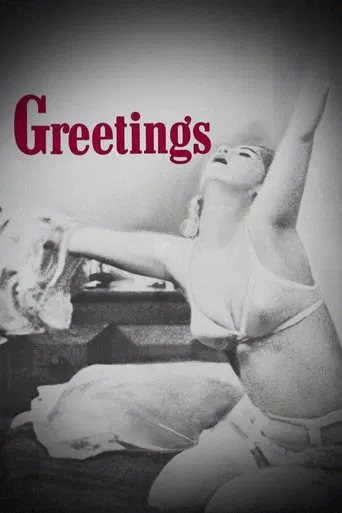

Go in cold, and you're likely to emerge with your blood boiling. This has to be seen to be believed.
... View MoreA movie that not only functions as a solid scarefest but a razor-sharp satire.
... View MoreEach character in this movie — down to the smallest one — is an individual rather than a type, prone to spontaneous changes of mood and sometimes amusing outbursts of pettiness or ill humor.
... View MoreThe movie really just wants to entertain people.
... View MoreThis movie is one of the best American movies in the sixties. It's form, sharpness, concision, subtlety and great comedy make it a peak of new-wave American cinema and show the real talent of Brian de Palma.If the movie is political, it is not a propagandistic one. It is a real artistic work, where everything is relative, fun is everywhere, politics is ridiculed just as the lack of politics. Nothing stands to the great destructive power of the irony and of the cinema. MASH by Altman can be compared to this movie.All this comes with a great directing skill and novelty. Hitchcock and French nouvelle vague can be an influence (they are actually cited in the movie), but de Palma is original and his merits are beyond any doubt.A masterpiece!
... View MoreThe most interesting thing about this early, cheap DePalma movie is DeNiro's performance, containing shades of his later work in Taxi Driver, The King of Comedy and Meet the Parents. In view of Greetings, and since it would appear the DeNiro didn't do the intense method preparation he became so famous for, we might wonder whether he actually isn't a very talented comedian who stumbled into method acting almost by accident (with a lot of hard work). Certainly his performance in Taxi Driver takes on a new dimension compared with his hilarious take on a Vietnam draftee pretending to be outrageously racist here. The careful, almost stilted speech he delivers straight to camera when he reads the sex book is reminiscent of the verbal fumbling of Rupert Pupkin. Indeed, his whole career is put into an entirely fresh perspective by this early, fresh performance, which is a must for anyone interested in his work.
... View MoreBrian De Palma, Robert De Niro in his first movie...it has to be good, right? That's what I thought. But I was hugely disappointed. "GREETINGS" is no more a comedy than SCHINDLER'S LIST. I didn't laugh a single time, nor grin or smile. It has one good gag, at the very end of the film, and if it had maintained that wit throughout I would have given it a higher rating.However it starts off very poor and only gets worse as time goes on. Made on a shoestring budget, and it shows in every scene. Continuity errors galore. De Palma, who edited the film, clearly has no handle on editing and literally jumps around from scene to scene. So, in one segment a group of characters are talking, and it suddenly jumps to fifteen minutes later in a different room, and they're still talking, and we're left wondering what on earth is going on.I only really wanted to see this because of Robert De Niro. I am a die-hard De Niro fan and will watch anything with him in it (I even sat through SAM'S SONG, which is even worse than this - by a long shot). However De Niro - despite top billing - is not in this film very much, and when he is, he's not very impressive. (Although he hardly does a bad job, either.) I couldn't believe De Palma was responsible for this film, it lacks all the typical Hitchcock trademarks of his. However, there are a few references - characters discuss the film BLOW-UP (1966) which he of course later loosely remade into BLOW OUT (1981) and at one point a female character subtly picks up HITCHCOCK / TRUFFAUT from a bookshelf and begins to read it.However the rest of this film lacks his typical visionary edge and I suppose it's because he was still learning (and that's clear in every frame). De Palma, never a friend of the MPAA, seems to push the boundaries a lot in GREETINGS and for the most part it's totally unnecessary. The whole subplot about De Niro's peeping-tom habits are disturbing and make us dislike his character - which is a problem since the sequel (HI, MOM! in 1970) revolves entirely around his character. (And for the record, GREETINGS was the first film awarded an X rating, which says something about its content. It's not too explicit nowadays, but we're left wondering WHY De Palma had to cram so much unnecessary sex and nudity into his film, because it seems like it's just there for the sake of being controversial - and almost 40 years later it is not controversial anymore, which makes it all the more outdated and pretentious.)Overall I was hugely disappointed in this movie. It's not funny. It's sophomoric, with stupid editing and direction (just watch the scene where De Niro and co. walk down a street and De Palma puts it in super-fast-motion - what the hell was he thinking?!). That, plus an unbearably outdated '60s overtone (and you thought EASY RIDER was outdated!) and truly awful theme tune (it sounds like the Beatles on drugs), make GREETINGS a truly disappointing experience.
... View MoreThis film is worth seeing just for JFK assassination recreation scene. One of the funniest individual scenes I have ever been witness to. Offbeat piece of film making from a future legend. DePalma is very satiric and DeNiro shows comedic ability that he won't display for another 25-30 years.
... View More